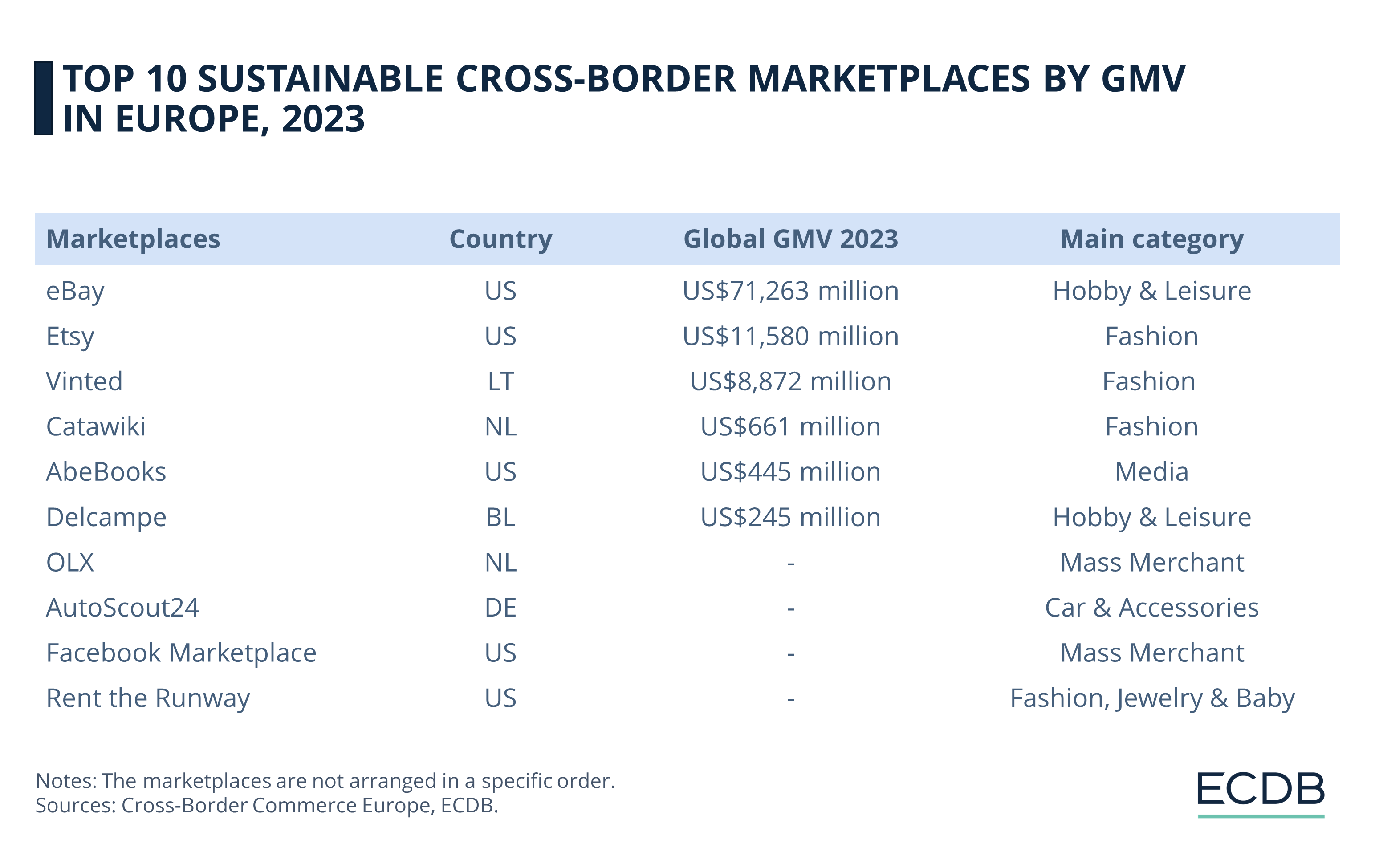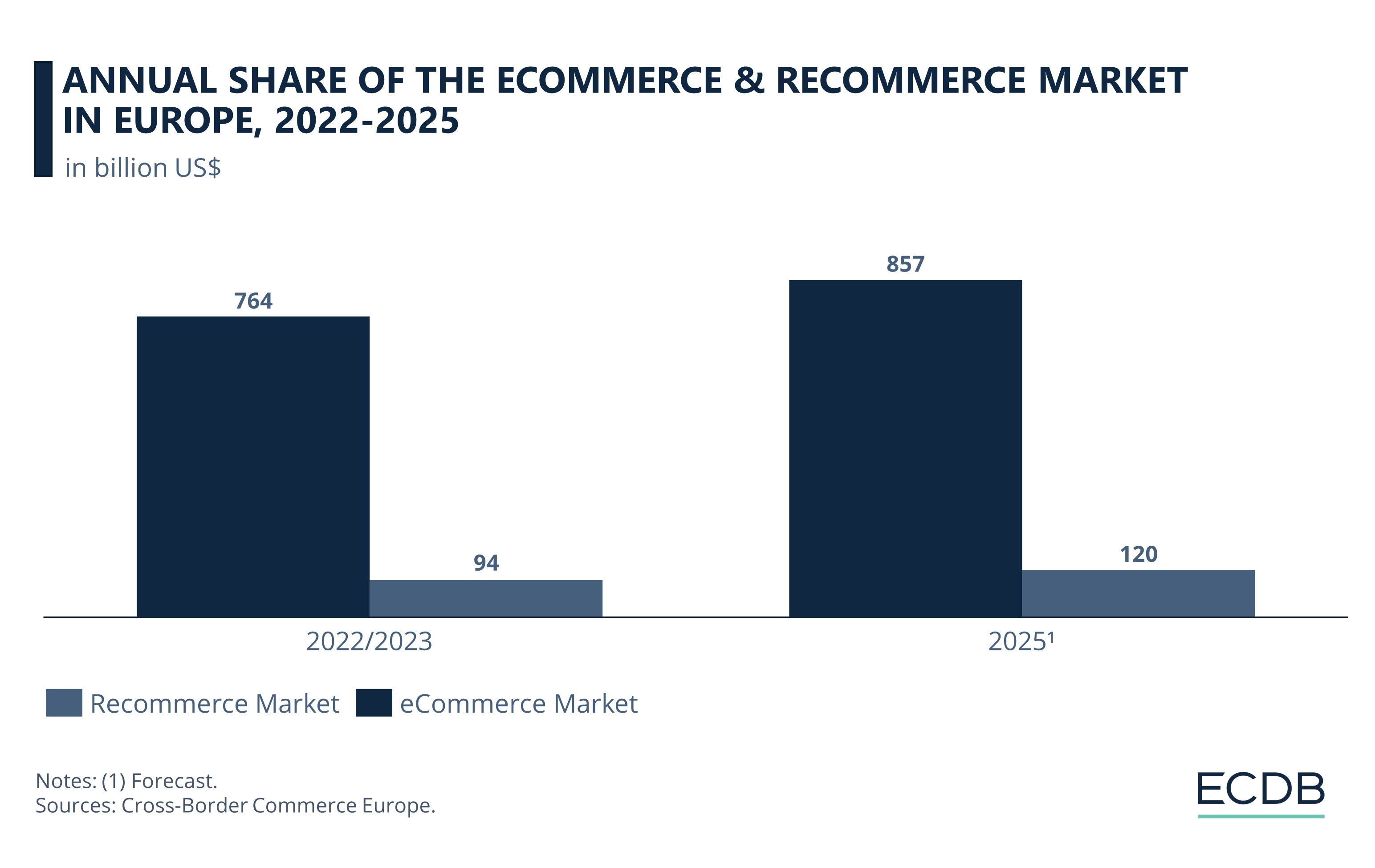Sustainable Marketplaces in Europe
Europe’s Top Sustainable Marketplaces: ReCommerce is a Growing Trend
Sustainability is playing an increasingly important role, both in general and in the eCommerce industry – but there is more to it than just reCommerce. How is the green trend influencing the cross-border sector in Europe?
Article by Antonia Tönnies | June 11, 2024
Europe's Top Sustainable Marketplaces: Key Insights
Reverse Commerce Market Growth: The global reCommerce market is set to reach an annual revenue of US$275 billion by 2028, demonstrating consistent growth from its 2024 value of US$207.4 billion.
Top Sustainable Marketplaces in Europe: Europe's most sustainable marketplaces include eBay, Etsy, Vinted, OLX, and others, all leveraging the resale of used goods to reduce waste and support the circular economy.
European Marketplaces Focus on ReCommerce: Nine of Europe's top ten cross-border marketplaces focus on resale, providing a sustainable alternative to traditional eCommerce, with Rent the Runway as the only rental-focused platform.
More Than Environmental Benefits: The reCommerce sector offers environmental advantages by reducing waste and conserving resources, while also providing budget-friendly prices and a broader variety of products, driven by a trend toward sustainability.
In recent years, the popularity of more sustainable consumption has found its way into the world of eCommerce. A common trend among sustainable marketplaces is reCommerce, which seems to be shedding its alternative shopping image.
The global reCommerce market is forecast to grow steadily, reaching an annual revenue of US$275 billion by 2028. The current market value is estimated at US$207.4 billion by 2024 – but what is the market like in Europe? Who are the leading marketplaces for sustainability?
Europe’s Most Sustainable Marketplaces: Who Are the Top 10?
One of the sustainability trends that is sweeping the industry right now is reCommerce, or reverse commerce, a subset of the eCommerce industry. As the name implies, this market generally refers to the sale of pre-owned products, i.e., used products as well as nearly new products. Because reCommerce gives products a second chance, this sales model is considered a sustainable eCommerce model.

A trend towards sustainability that has also reached the top 10 of the most sustainable cross-border marketplaces in Europe, but which sustainable marketplaces are included in this ranking?
Who Are the Top 10 Sustainable Marketplaces in Europe?
eBay: The U.S. marketplace is one of the largest platforms for reCommerce in Europe, with a global gross merchandise value (GMV) of US$71.3 billion in 2023. eBay is a mass marketplace that facilitates the buying and selling of a wide variety of used items, mostly locally, especially in the hobby and leisure categories (26%), reducing the demand for new products.
Etsy: Another marketplace in this ranking, again from the United States, is Etsy, with a GMV of US$11.6 billion in 2023, primarily driven by the fashion category (42%). Here, too, users can buy and sell locally, with a large number of secondhand products in addition to handmade items.
Vinted: Another player in the fashion sector and one of the most sustainable cross-border marketplaces in Europe is Vinted, which reached a GMV of US$8.9 billion in 2023. Here, third parties can buy and sell mainly used fashion (84%), supporting the principles of the circular economy.
Catawiki: The Dutch marketplace Catawiki describes itself as "Europe's fastest growing online auction platform" and offers products ranging from unique items to hard-to-find collectibles. The majority of items offered fall into the main category of fashion (40%), while it has a GMV of US$661 million in 2023.
AbeBooks: As a part of Amazon.com, Inc., Abebooks focuses on the main category hobby & leisure, more precisely media (100%), and generated with it a GMV of US$445.1 million in 2023. The marketplace was launched in 1996 for third parties only.

Delcampe: Founded in Belgium, Delcampe is a platform for collectors looking for high-quality products in the hobby & leisure (100%) category, such as stamps, coins, photography and vintage items. The preservation and reuse of these items is encouraged by this niche market, which generated a GMV of US$231 million in 2023.
OLX: The Dutch marketplace is according to Cross-Border Commerce Europe the number 1 sustainable marketplace. Growjo estimates OLX Group’s annual revenue currently at US$950.4 million per year. In addition to its focus on secondhand trade, the marketplace is encouraging the growth of a circular economy, as the company says:
“We’re building a more sustainable world through trade” – OLX Group
AutoScout24: The third-party only marketplace specializes in the resale of used as well as new cars, motorcycles, and utility vehicles. The German company has an annual revenue of approximately US$149.6 million, according to Growjo. By extending the life cycle of vehicles through resale, it reduces the need for new production, conserving resources and minimizing waste.
Facebook Marketplace: Meta launched the Facebook Marketplace in 2016, when it was still called Facebook. Part of the Facebook social media app, the marketplace works similarly to eBay, allowing users to buy and sell locally. The revenue of the shopping platform is estimated at US$6.8 billion by Market.us Scoop.
Rent the Runway: The fashion company Rent the Runway launched in the United States in 2009 with a new concept of consumption where users can rent clothes. This business model not only gives consumers more choices in their closets, but also extends the life of clothing. According to the company's most recent published report, Rent the Runway will have annual revenues of US$298.2 million by 2023.
As the ranking shows, reCommerce is at the heart of the matter right now when it comes to sustainable marketplaces. In Europe, 9 of the top 10 marketplaces are dedicated to the resale of used goods. Some of them are specialized in certain categories, such as AutoScout24 for cars and Abebooks for media, or they try to offer everything from A to Z as a mass merchant like OLX and eBay.
Are AliExpress, Temu and Wish Sustainable?
While many U.S. marketplaces such as Etsy, and Facebook Marketplace can be found in this ranking, no Chinese marketplace is in the top 10, even though in the general cross-border eCommerce in Europe we see that a lot of goods usually come from the United States as well as from China.
AliExpress, Temu, Wish, DHGATE, Joom and Taobao underperform in terms of sustainability, according to Cross-Border Commerce Europe's marketplace ranking. They all follow a business model of intercontinental logistics, which generates high levels of CO2 emissions – anything but sustainable.
European ReCommerce Expected to Grow
The European reCommerce market, like the global reCommerce market, is set to grow. In total, 12.3% of the 2022/2023 eCommerce market revenue in Europe had been generated by the eCommerce sector, representing US$94 billion of the US$764 billion eCommerce revenue. By 2025, the European reCommerce industry is forecast to grow by 27% to reach US$120 billion since 2023. This represents an increase of 1.7% within the share of European eCommerce (14%).

Why is the ReCommerce Sector Booming?
Figures of Cross-Border Commerce Europe show that the European reCommerce sector is expected to grow slightly faster than the eCommerce industry itself, and 20 times faster than the broader retail market. Younger users in particular are driving the secondhand swing, and the reasons for this upward trend include:
Positive impact on the environment: Reduces waste by giving products a second life, thus conserving resources.
Budget-friendly pricing: Pre-loved items are usually less expensive than new, attracting shoppers looking for a bargain.
More product variety: ReCommerce doesn't follow trends and has a wide selection of products from different decades.
Becoming a vendor: Selling one's possessions as a means of decluttering or for personal financial gain.

Europe's Top Sustainable Cross-Border Marketplaces: Closing Thoughts
Sustainable shopping is not just about reusing products – it is also about rethinking how goods are transported and delivered. Domestic marketplaces in Europe are therefore better positioned than intercontinental marketplaces that deliver from distant countries such as the U.S. or China.
In a globalized world like ours, limiting the market geographically is no solution. To become greener, businesses and consumers alike must consider not only what they buy, but also where it comes from and how it gets to them and make improvements in these areas.
_________
Sources: ECDB, secondary sources in the referenced articles.

Click here for
more relevant insights from
our partner Mastercard.
Related insights
Deep Dive
Secondhand Fashion Online Market in the UK: Categories, Preferences by Generation, Top Stores
Secondhand Fashion Online Market in the UK: Categories, Preferences by Generation, Top Stores
Deep Dive
Gen Z Online Shopping Behavior: Consumer Habits, Preferences & Trends
Gen Z Online Shopping Behavior: Consumer Habits, Preferences & Trends
Deep Dive
Guess Joins an Affiliation with SuperCircle for Clothing Recycling Program
Guess Joins an Affiliation with SuperCircle for Clothing Recycling Program
Deep Dive
Trends in German eCommerce: Germans Like What They Know
Trends in German eCommerce: Germans Like What They Know
Deep Dive
Almost Two-Thirds of German Consumers Favor Drone Delivery of Packages
Almost Two-Thirds of German Consumers Favor Drone Delivery of Packages
Back to main topics